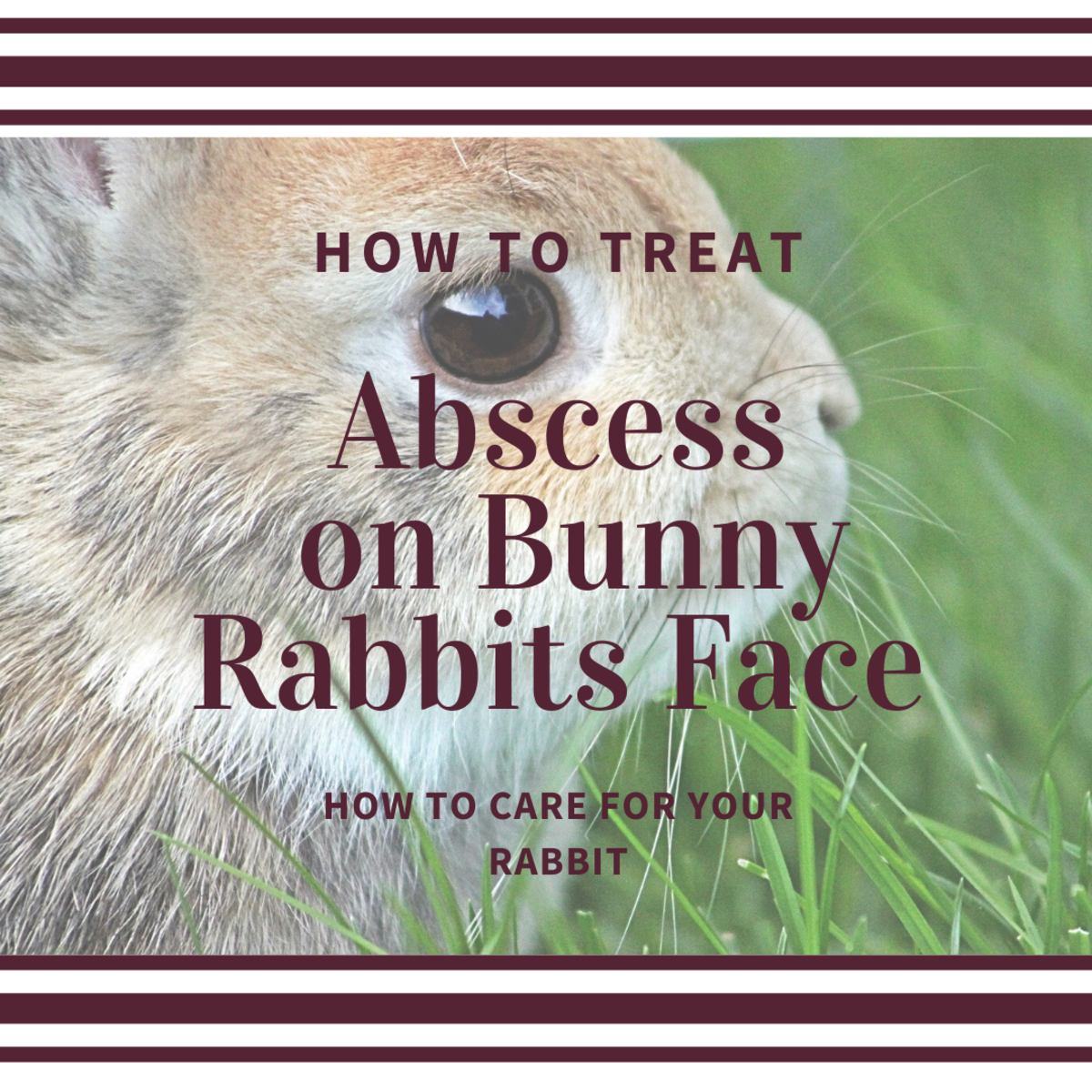The Problem With Older Rabbits
The problems with Rabbits, especially as they get older.
You may have one already or are considering buying one for yourself or a member of your family and want to know more. Well I can tell you, the truth of the 'cuddly pet bunny' is a myth. Speaking as a rabbit owner I want to share information with you about the small furry animals we know and love. Not to scare or upset you but to show you what the darker side of owning a bunny is.
1. You buy that bunny young, it won't be young a fit forever.
As with everything, rabbits will not remain fluffy, tiny young ones all fit and full of life forever they will age and certain breeds MUCH faster than others. Larger rabbits and real dwarf bunnies, purebred and Rex have the shortest life spans of 2-5 years. Giants barely touch 5. It is possible with proper care they may live to 6 or 7 but the average lifespan of a normal, lop, healthy bunny is between 7-14 years. Many rabbits (indoor most commonly) reach the age of 10 so if you are thinking of buying one be prepared to have an elderly bunny for a few years.
As they age they tend to have problems with their spine, their bones and spines are unpredictable and extremely fragile to begin with and as they age it becomes worse. Paralysis is a very common problem and a few months ago killed off my bunny Molly (whom was not left to suffer). They start with loss of balance or seemingly a wet bottom and legs and slowly start to struggle or drag their legs, they can't run about and have trouble jumping or climbing their hutch ladder. Their tail will also flop and fall and seem like 'not a part of them' this cannot be repaired and once it starts it doesn't stop over a few months it can and will get a lot worse until the rabbit is in chronic arthritic pain and needs to be put down.
Oldies are also prone to heart attacks, shock, illness and upset from environment e.g. changing seasons.
2. Rabbits can and often do suddenly die.
Sudden death in rabbits is a very common problem, your bunny could be 6 months old enjoying life bouncing around all day and within an hour you turn your back and the animal is sprawled out dead on the floor for no reason. It is very hard to tell why unless there were obvious signs of illness, were attacked or there was a good reason why hey had a heart attack from fright e.g. neighbours dog suddenly appeared and shocked them.
You could put your rabbit away at night and come back to a half eaten mess the next morning (fly strike a serious, agonising and 99% of the time incurable problem in summer) flies lay eggs on the rabbits back or poop which hatch into maggots and eat it alive. They die within hours.
Eat the wrong thing and they can suddenly go, rough handling and it can easily damage their organs or spine (this is why a lot of places refuse sale to people buying for children) or fright can and will kill them prematurely if not instantly. An injury is hard to detect unless it is extremely severe as the animal will force itself to behave as normally as possible to try and show predators it is not hurt so is not an easy target.
3. Unwanted pregnancy or problem birth.
You can easily buy a pregnant rabbit, usually they are shipped to pet shops young and mixed, sexed in the shop and unneutered. They could easily become pregnant with their brother (especially if missexed) too young and end up dying or having a baby stuck inside them which causes death. In older rabbits or over bred rabbits this could be a serious problem.
Often they are inbred and sometimes breeders will breed very young or be very careless with them.
4. Rabbits are prone to illness and expensive to treat.
Rabbits are almost if not in some cases as expensive as cats and dogs, they can be much harder to treat with much lower success rates. It can be hard to diagnose a problem and they can and do become seriously ill within a matter of hours. Rabbits can get cancer, respiratory diseases, infections of every description, mites, maggots and broken limbs. It is important to get everything checked out immediately so the problem can be caught early, rabbits unlike humans cannot 'wait a few weeks and see if it improves' they don't count weeks they count hours. (check my other hubs for information on sudden death and illness)
5. They require a lot of space and shouldn't be kept alone.
Lonely rabbits can die, even if a human gives lots of company it is not the same it is like a human trying to keep company from a rabbit alone themselves, it isn't the same as someone of your species.
A double hutch and a large run with grass and shade is essential for a single rabbit, the more you have the more space is required. Male and female rabbits (doctored) can be kept together, same sex very rarely works and can lead in the rabbits tearing each other apart, they can be very vicious animals.
The best option is to bunny proof a room or two of your house, they live longer indoors.
6. They aren't always cuddly.
More often than not rabbits don't like being picked up or cuddled. They can bite, kick, scratch and growl. Yes, growl.
First time pet owners or children whom pick up a rabbit that doesn't like it or is a new member of the family should expect some grunting and even kicking or thrashing, it is important to NEVER let go or squeeze a struggling rabbit as they could fall and easily break or severely damage their brittle bones and spines causing death in agony. Some are more difficult than others to handle but doing it gradually and often can help, if it really won't let you handle it don't force and never pick a rabbit up by the ears.
7. Be careful if you have other pets.
Even animals that seem fine, one playful encounter or fright and the rabbit could easily become injured or die from shock even a week later.
If you have cats they will stalk and prowl a rabbit and my rabbit used to really fight back so not just for the sake of a torn apart cat or dog but for the rabbit too. Rabbits can be very aggressive even towards humans, I have heard stories and seen rabbits on TV that have torn off a large dogs genitals or caused them serious harm out of pure aggression. NEVER, EVER BUY A RABBIT IF YOU HAVE A FERRET. A ferret will be driven wild by rabbit scent and stop at nothing until they kill that bunny, they can never be friends and will ALWAYS attack a rabbit.
8. Buy a care guide/book and research as much as possible before getting a rabbit.
They are an ENORMOUS commitment that will bring you years of happiness if everything goes right. If not you could have a horror story.
- Think about when and if you want to go on holiday even for a weekend trip.
- Are you working full time?
- Do you have the space?
- Can you afford £50-100 per rabbit for doctoring?
- Can you afford vet bills? What about general food, bedding and housing?
- Do you have young children or other pets?
- Can you give a rabbit love and affection every single day?
Please do not buy a rabbit if you answer no to any of these questions. Just because you want one 'I'll get one anyway' will not only be a waste of money but a heartbreak when you have to part with it/them or it becomes hurt or killed by something or someone. Cheap isn't always the best option when it comes to fragile pets.
9. Rabbits are messy and are prone to a dirty bottom.
The normal runny poop they pass (and re-ingest so they can pass food normally through their bodies) can easily become stuck around their bottom or genitals blocking the passages, burning the skin and in any time of year there are flies around, flystrike will happen within hours and the rabbit will die in extreme pain being eaten alive inside out by maggots it is incurable.
They need their cage cleaned twice a week if not more in summer and need to be constantly checked for mites, dirty bum and other problems. If you are not willing to pull chunks of sticky smelly poo from their bum with your fingers, reconsider, this is a problem for ALL rabbits especially as they get older or are eating too many greens.
10. Is a rabbit really the right pet for you?
Please think long and hard, too many rabbits are left to starve, suffer or die in pain or from illness because people can't be bothered, don't know how or can't afford to look after them properly. They have a good long life span for a small animal please take good care of them. Too many are left in shelters or set wild (and will be killed by other animals) they are pets they aren't built to survive on their own.



